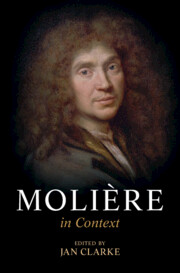Book contents
- Molière in Context
- Molière in Context
- Copyright page
- Dedication
- Contents
- Figures
- Charts and Tables
- Contributors
- Acknowledgements
- Translations
- Abbreviations
- Biographical Preface
- Part I Socio-Political Context
- Part II Intellectual and Artistic Context
- Part III Theatrical Context (Paris)
- Part IV Theatrical Context (Court)
- Chapter 18 Colbert, Cultural Policy and the Propaganda of Spectacle
- Chapter 19 The Decors of Comedy-Ballet: From the ‘Songe de Vaux’ to the ‘Rêve de Versailles’
- Chapter 20 Court Performances and Their Audiences
- Chapter 21 Music
- Chapter 22 The Livrets of Molière’s Plays
- Part V Reception and Dissemination
- Part VI Afterlives
- Further Reading
- Index
Chapter 21 - Music
from Part IV - Theatrical Context (Court)
Published online by Cambridge University Press: 10 November 2022
- Molière in Context
- Molière in Context
- Copyright page
- Dedication
- Contents
- Figures
- Charts and Tables
- Contributors
- Acknowledgements
- Translations
- Abbreviations
- Biographical Preface
- Part I Socio-Political Context
- Part II Intellectual and Artistic Context
- Part III Theatrical Context (Paris)
- Part IV Theatrical Context (Court)
- Chapter 18 Colbert, Cultural Policy and the Propaganda of Spectacle
- Chapter 19 The Decors of Comedy-Ballet: From the ‘Songe de Vaux’ to the ‘Rêve de Versailles’
- Chapter 20 Court Performances and Their Audiences
- Chapter 21 Music
- Chapter 22 The Livrets of Molière’s Plays
- Part V Reception and Dissemination
- Part VI Afterlives
- Further Reading
- Index
Summary
Molière’s comedy-ballets and the tragedy-ballet Psyché, many written in haste, form a heterogenous whole, but we must not forget the habitual presence of music in theatre of the time. Molière, himself an amateur musician, gave himself a number of roles involving singing, and music – that attribute of a cultivated, city-based society – is discussed in his plays, often ironically. Comedy-ballet – inspired musically by the court ballet – was a princely spectacle performed in the royal residences, and Molière benefitted from exceptional financial, technical and musical resources. He may have been given a free choice regarding their subjects, but he relied heavily on instrumentalists and dancers from the royal institutions, many of whom had participated in the great ballets of previous years, and his comedy-ballets gained from their qualities. Comedy-ballet was, therefore, devised in view of the effects desired and the means at his disposal. Most were organised around scenes or characters taken by Molière and Lully from a topical repertoire and composed according to a variety of writing conventions. Certain scenes were suggested to Molière by Lully, and some comedy-ballets were entirely devised around musical scenes in the same way as was the case for ballets.
- Type
- Chapter
- Information
- Molière in Context , pp. 202 - 209Publisher: Cambridge University PressPrint publication year: 2022

